Buildings 2.0
Buildings 2.0 dives deep into the technology, trends and talent reshaping the structures where we live and work. Hosted by Jose Cruz Jr, this podcast brings you interviews with the industry’s brightest minds, from visionary architects and property owners to chief innovation officers. Brought to you by Integrated-Projects.com.
Episodes
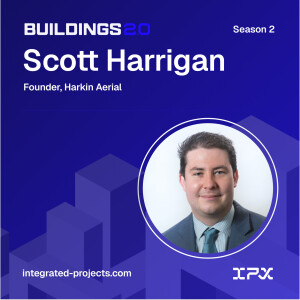
Monday Apr 21, 2025
Monday Apr 21, 2025
In this episode, Jose Cruz speaks with Scott Harrigan about the evolving role of drones in construction and surveying. They discuss common misconceptions about drone technology, its applications in various fields, and the significant advancements in camera technology that enhance data capture. Scott explains the efficiency and accuracy of drone surveys, the return on investment for using drones, and the types of outputs that can be generated. The conversation also touches on budgeting for drone services, the increasing acceptance of drones in government projects, and the regulatory landscape surrounding drone operations. In this conversation, Scott Harrigan from Harkin Aerial discusses the evolving landscape of drone technology, focusing on regulatory challenges, the potential for drones to replace scaffolding in inspections, and the future of drone delivery. He shares his personal journey from an MEP engineer to a drone entrepreneur, emphasizing the importance of industry knowledge and experience for aspiring drone professionals. The discussion also touches on the impact of AI on drone operations and data processing.
Takeaways
Drones are now essential tools in construction projects.
Misconceptions about drones often stem from outdated views.
Drones can cover large areas quickly, improving efficiency.
Accuracy of drone surveys can be within an inch.
Facade inspections benefit greatly from drone technology.
Drones can produce high-resolution 3D models.
Budgeting for drone services can be based on acreage or square footage.
Government agencies are increasingly using drones for asset documentation.
Drone operations are highly regulated by the FAA.
Licensing is required to operate drones commercially. Drones are subject to regulatory hurdles, but recent changes have made permitting easier.
Drones can potentially replace scaffolding for visual inspections, reducing urban clutter.
Drone delivery is likely to be niche rather than widespread in urban areas.
Experience in related industries is crucial for success in drone operations.
AI is beginning to play a significant role in data processing for drone technology.
Drones are best utilized in conjunction with other technologies for efficiency.
The future of drone delivery may focus on remote areas rather than urban centers.
Safety regulations are paramount in drone operations to protect the public.
Drones can provide valuable data for architects and engineers during projects.
The integration of drones into existing workflows can enhance project efficiency.
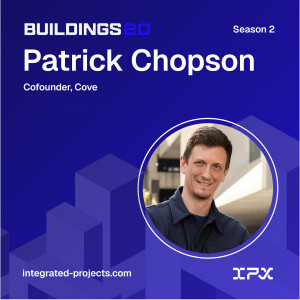
Sunday Apr 13, 2025
Sunday Apr 13, 2025
In this episode, Jose Cruz speaks with Patrick Chopson, co-founder and chief product officer at Cove, about the transformative role of AI in architectural design. They discuss the shift from traditional architectural services to AI-powered solutions, the importance of design excellence, and the evolving business models in the architecture industry. Patrick shares insights on hiring top talent, the challenges of innovation in established firms, and the future implications of AI in architecture. He emphasizes the need for architects to engage with new technologies and adapt to the changing landscape while maintaining a focus on design quality.
Takeaways
Cove has transitioned to AI-powered architectural services.
AI can enhance collaboration in the design process.
On-time delivery is a significant concern for architects today.
Design revisions can be costly, impacting profitability.
AI tools can streamline feasibility studies and design processes.
Hiring top talent is crucial for maintaining design excellence.
Innovation in architecture is often hindered by traditional firm structures.
AI will play a pivotal role in the future of architectural design.
New architects should embrace AI tools and technology.
The core principles of design excellence will remain unchanged.
#aiarchitecture #cove
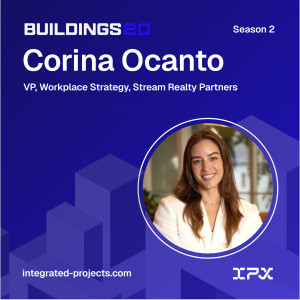
Saturday Apr 12, 2025
Saturday Apr 12, 2025
In this episode of Buildings 2.0, Jose Cruz speaks with Corina Ocanto, Vice President of Workplace Strategy at Stream Realty Partners. They explore the evolution of workplace strategy, the importance of culture, the challenges of remote and hybrid work, and the impact of technology on workplace dynamics. Corina shares insights on how to create effective office spaces that foster collaboration and engagement, while also discussing the future of workspaces and the need for a more human-centered approach to design.
Takeaways
Corina's journey into workplace strategy began with a passion for design and problem-solving.
Understanding the client's perspective is crucial for effective workplace design.
Curiosity and asking the right questions are key to successful workplace transformations.
Culture plays a significant role in how workplaces function and should be considered in design.
The evolution of office spaces is driven by the need for efficiency and purpose.
Technology can enhance workplace experiences but must be used thoughtfully.
Creative uses of office spaces can foster engagement and collaboration.
The future of workspaces will likely involve mixed-use developments and more flexible designs.
Quality of space and human interaction will remain important in the future of work.
Training for managers is essential to implement effective workplace strategies
#workplaceculture #officespaces
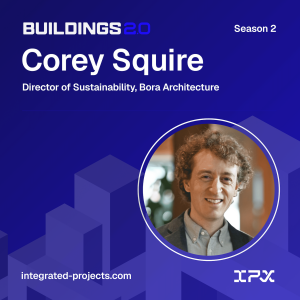
Monday Mar 03, 2025
Monday Mar 03, 2025
In this conversation, Corey Squire, Associate Principal and Sustainability Director at Bora Architecture, shares his journey into sustainable design, emphasizing the importance of metrics, human-centric approaches, and the role of policy in architecture. He discusses common misconceptions about sustainability, practical strategies for young designers, and the significance of renovation over new construction. The conversation also touches on the tools and technology used in design, the creation of spaces that promote happiness, and the future of sustainable architecture.
Takeaways
Sustainable design should focus on measurable impacts on building performance.
Sustainability is about creating healthy indoor environments for people.
Common misconceptions about sustainability often relate to cost.
Orientation and window placement are critical for energy efficiency.
Framed views in architecture enhance the user experience.
Renovating existing buildings can be more challenging but is essential.
Modern technology can significantly improve the performance of older buildings.
Sustainability metrics should be specific and relevant to the project goals.
The architecture industry is increasingly focusing on renovation projects. Over 50% of architecture revenue will come from existing buildings.
Decarbonization of buildings must happen at an unprecedented rate.
Renovation is often more complex than new construction due to policies.
Tools should enhance, not replace critical thinking in design.
Human happiness in spaces is driven by biological and environmental factors.
AI has limited effectiveness in generating meaningful architectural designs.
Best practices in design must be contextualized to specific communities.
The definition of good design is shifting towards community impact.
Future architecture will prioritize sustainability over aesthetics.
The architectural community is in a transitional period regarding design values.
Listen to more episodes:
Apple
Spotify
YouTube
Website
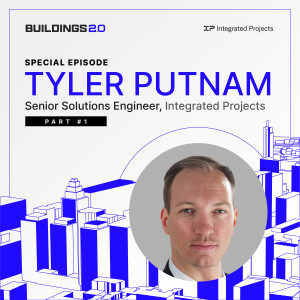
Thursday Jan 23, 2025
Thursday Jan 23, 2025
In this first installment of a two-part series on Buildings 2.0, Tyler Putnam, Senior Solutions Engineer at Integrated Projects, shares his innovative approach to merging architectural practice with technology and business innovation. Drawing from his equity-based design firm experience to pioneering BIM implementation at major architectural firms, Tyler discusses how digital transformation is reshaping traditional roles.
He also explores the evolution from CAD to BIM, emphasizing the importance of organizational change and business alignment. His insights on scan-to-BIM technology and digital twins show how data-driven approaches are revolutionizing building ownership and management, while his thoughts on procurement processes highlight opportunities for industry-wide improvement.
Topics discussed:
Revolutionizing architectural practice through equity-based design services, combining traditional design roles with innovative business models and construction integration.
The transformation from CAD to BIM workflows, in particular organizational change management and business alignment for successful implementation.
How scan-to-BIM technology serves different stakeholders, from architects and engineers to owners, creating a unified source of truth
The future of digital twins and data-driven decision making in building ownership, moving beyond traditional documentation methods.
The evolution of procurement processes and the need for better project initiation workflows in the architecture industry.
The historical shift in architectural roles from master builders to coordinators, and exploring paths to reclaim essential agency in project delivery.
Leveraging technology automation and computational design to transform traditional architectural processes and improve project efficiency across stakeholders.
Listen to more episodes:
Apple
Spotify
YouTube
Website
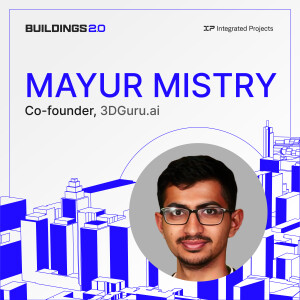
Thursday Jan 16, 2025
Thursday Jan 16, 2025
In this episode of Buildings 2.0, Jose speaks with Mayur Mistry, Co-founder, 3DGuru.ai and 3DGuru MVP Labs. Through his organizations, Mayur is democratizing AI tools for architecture and construction firms. He shares eye-opening insights about how the technology landscape has evolved, from needing 5,000 images to train an AI model in 2019, to now requiring just 5 images and a few dollars. Through his consulting work, he's also tackling a crucial challenge: helping medium-sized firms innovate without the hefty budgets typically needed for internal tool development.
Mayur explores practical frameworks for AI adoption, the importance of specialized data in beating bigger competitors, and why firms need to think strategically about their data today to stay ahead tomorrow. Mayur also shares valuable insights about different AI models (Claude vs. OpenAI vs. Llama) and how firms can choose the right tools for their specific needs.
Topics discussed:
How AI tools have become radically accessible going from requiring 5,000 images and specialized knowledge in 2019 to now needing just 5 images and the cost of a coffee.
Strategic approaches for firms to adopt AI: starting with pilot projects, focusing on immediate ROI, and leveraging no-code/low-code solutions for quick implementation.
Why firms need a robust data strategy today, including organizing unstructured data, leveraging specialized knowledge, and preparing for future AI implementation.
AI model selection, such as when to use Claude for coding tasks, OpenAI for general applications, and Llama for data-sensitive operations within firms.
Bootstrapping lessons learned on why starting with service-based consulting helped validate market needs and generate immediate revenue while building the product.
Breaking down AI agents, including how natural language can now orchestrate complex workflows, from real estate prospecting to automated design tasks in architecture.
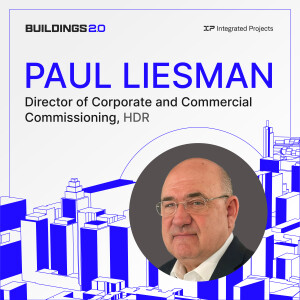
Thursday Jan 09, 2025
Thursday Jan 09, 2025
Paul Liesman, Director of Commercial and Corporate Commissioning, HDR, joins Jose on Buildings 2.0 to help demystify building commissioning and share his perspective on New York's ambitious decarbonization goals.
With over two decades of experience, Paul discusses why nothing really works without commissioning, the challenges of Local Law 97 implementation, and the evolving landscape of building adaptations. His practical insights on building systems integration and the future of construction provide valuable context for anyone involved in the building industry.
Topics discussed:
Early involvement of commissioning agents — before construction even begins — ensures proper planning, pricing, and partnership with the entire construction team.
Integration testing of building systems reveals how components interact, especially during critical events like power transitions.
Local Law 97 and LEED requirements are driving more rigorous commissioning standards, particularly for building envelopes, where significant heat loss occurs despite efficient HVAC systems.
Decarbonizing NYC's million buildings by 2030 faces practical challenges, from electrical infrastructure capacity to the financial burden on smaller building owners dealing with higher interest rates.
Although office-to-residential conversion dominates discussion, challenges like plumbing density and daylight requirements suggest we need more creative solutions for underutilized commercial spaces.
Historic buildings show potential for conversion to light manufacturing, leveraging high ceilings and robust floor structures to bring production back to urban cores.
Despite technological advances like automated CMU laying, successful construction will always require coordinated teams of architects, engineers, contractors, and specialized trades working together.
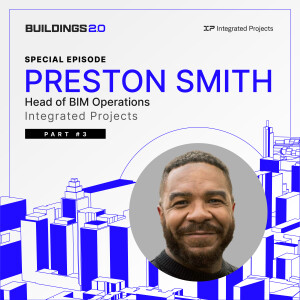
Thursday Dec 26, 2024
Thursday Dec 26, 2024
In our third and final part of the conversation series, Jose and Preston Smith, Head of BIM Operations at Integrated Projects, talk about the intersection of culture, leadership, and innovation in the AEC industry. Preston highlights how fostering a strong cultural foundation can help organizations overcome industry challenges, improve team alignment, and drive project success.
In particular, he stresses the importance of clear communication and collaboration across diverse teams, as well as the transformative role of innovation in reshaping traditional practices. Preston also offers actionable strategies for leaders looking to build a people-first culture and inspire their teams to excel.
Topics discussed:
The impact of a strong organizational culture on overcoming industry challenges and driving innovation in AEC.
Strategies for improving communication and collaboration across diverse teams to ensure alignment and shared vision in complex projects.
Why prioritizing people and building trust within teams are essential for long-term project success in the AEC industry.
How innovative approaches can transform traditional processes and create opportunities for growth in AEC organizations.
The role of leadership in fostering a culture of accountability, creativity, and shared goals within AEC teams.
Practical steps for aligning teams around shared values and ensuring everyone is invested in the success of a project.
The importance of adaptability and resilience in leadership to meet the evolving demands of the AEC industry.
Lessons learned from challenging projects and how they inform better practices and solutions moving forward.
The connection between a people-first approach and achieving better project outcomes and client satisfaction.
How innovation and leadership intersect to create a more efficient, collaborative, and successful future for AEC projects.
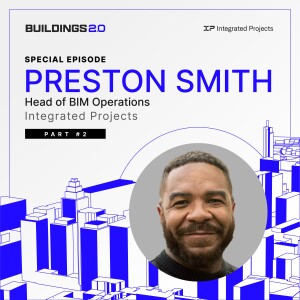
Thursday Dec 19, 2024
Thursday Dec 19, 2024
In part two of their three-part conversation, Jose and Preston Smith, Head of BIM Operations at Integrated Projects, explore the transformative potential of technology in the architecture, engineering, and construction (AEC) industry.
Preston emphasizes the critical role of leadership in adopting modern tools, aligning team goals, and fostering collaboration. He shares insights into empowering teams through data-driven decision-making and bridging traditional workflows with innovative solutions.
They also discuss strategies for overcoming resistance to change, sustaining momentum in tech adoption, and aligning timeless design principles with cutting-edge tools. Don’t miss Preston’s vision for reshaping the AEC landscape through leadership, collaboration, and technology integration.
Topics discussed:
The role of leadership in driving technological change and ensuring teams are aligned toward adopting modern solutions in the AEC industry.
Overcoming resistance to change in the AEC sector by fostering collaboration and addressing concerns through effective communication and shared goals.
How integrating data-driven decision-making can improve project outcomes and build trust across teams in complex architectural and construction workflows.
Strategies for bridging traditional AEC workflows with modern tools to streamline processes while preserving timeless design principles.
Addressing challenges in sustaining momentum for tech adoption across diverse teams in the architecture and construction industries.
The importance of cultivating a collaborative culture that encourages openness to innovation and continuous improvement in design and construction.
Using technology to create more efficient workflows that improve communication, transparency, and productivity in large-scale architectural projects.
How data insights can empower teams to make more informed decisions, enhancing project efficiency and reducing risk throughout the lifecycle.
Preston’s vision for reshaping the AEC landscape by leveraging technology to support creativity, collaboration, and long-term sustainability.
Aligning leadership, tools, and team goals to drive transformative change and unlock new opportunities for growth in architecture and construction.
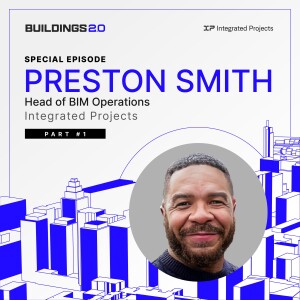
Thursday Dec 12, 2024
Thursday Dec 12, 2024
Recently on Buildings 2.0, Jose welcomes Preston Smith, Head of BIM Operations at Integrated Projects to our three-part series where they dive into the evolving role of technology in architecture and construction. Preston discusses how leadership drives digital transformation, emphasizing the need for a clear vision to modernize workflows and improve outcomes.
In this first part of the series, Preston also highlights the importance of embracing data-driven insights to foster collaboration across teams, ultimately reducing inefficiencies and driving project success. Additionally, he sheds light on the unique challenges of scaling innovative solutions in an industry rooted in traditional practices.
Topics discussed:
How leadership drives digital transformation in the architecture and construction industries.
Leveraging data-driven insights to enhance collaboration and reduce inefficiencies across project teams.
Balancing traditional practices with the adoption of innovative technologies in construction workflows.
Creating a shared vision to align teams and stakeholders during large-scale digital transformations.
Designing tech solutions that are user-friendly and seamlessly integrate into existing workflows.
Overcoming industry resistance to change by demonstrating tangible benefits of technology adoption.
Strategies for scaling innovative solutions while maintaining operational efficiency in construction projects.
The critical role of leadership in fostering a culture of innovation and adaptability within organizations.
Identifying barriers to tech adoption in construction and actionable steps to address them.
The future of data utilization in shaping smarter, more collaborative construction processes.


